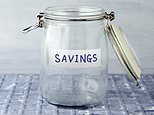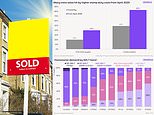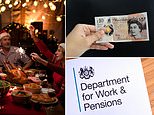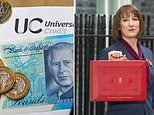Black Friday is nearly here - how to tell if a deal is too good to be true
- Discounted prices may not be as good as they seem at first glance, experts warn
Black Friday is almost here, and with it the promise of cheap online shopping deals - but are these offers all they're cracked up to be, and how can you tell?
Black Friday is a sales period that has become the unofficial start of the Christmas shopping season.
The trend started in the US, and has grown from being a single day of sales to several weeks, with many major retailers taking part. This year, Black Friday falls on 29 November.
While the Black Friday festival of consumerism can offer some genuine bargains, research has found that most advertised 'deals' do not offer shoppers any meaningful savings they can't get at other times of the year.
Not only this, but the shopping period also comes with a higher risk of fraud, overspending and debt.
This is everything you need to know about safely navigating the Black Friday sales - and how to tell a real bargain from a fake one.

An arm and a leg?: Black Friday sales have been criticised by retail experts, who say they are often not the amazing offers that consumers are led to believe
Does Black Friday really have the best prices?
Most Black Friday offers seem too good to be true for a simple reason - they are.
In fact, nine out of 10 Black Friday offers are the same price or cheaper at other times of the year, according to research from consumer organisation Which?.
While retailers rarely claim that Black Friday deals offer the greatest savings, Which? said that 'shoppers could be forgiven for believing this' due to heavy marketing around the sales period.
Which? looked at deals on 227 products in last year's Black Friday fortnight between 20 November and 1 December.
It found that 92 per cent of these deals - all from major retailers - could be found at the same price or less at other times of the year.
Shockingly, Which? found also 14 'deals' where the alleged 'before' price of a discounted item had never been charged in the preceding year, meaning the offer was not as good as advertised.
Even more shockingly, many websites host 'fake sales' where prices are deliberately inflated before Black Friday, in order to make subsequent 'discounts' seem better, according to price-checking website PriceSpy.
PriceSpy analysed almost five million prices and found that, since 1 October, 33 per cent (1.6 million) prices have increased. Sixteen per cent of prices rose by more than 10 per cent.
How do I know if a Black Friday discount is a good deal?
There are two ways of looking at this question.
The simple way is to say that if you see an item in a Black Friday sale that you wanted anyway, and you are happy with the price, then it is a good deal.
The thriftier way is to question whether the advertised Black Friday sale price is the best possible price, and whether it is worth buying the item now or waiting.
If you take the latter view, and you are shopping online, then your best friend should be price-tracking tools which compare the cost of items over time.
If you are shopping on Amazon, the Camel Camel Camel website tells users when items are cheap, as well as when prices have been changed and by how much.
The websites Idealo, Pricechecker, Pricerunner and PriceSpy compare the cost of the same item across multiple retailers - and even in physical stores.
If you are shopping in a bricks-and-mortar store, the Idealo app lets you scan a bar code for an item and check if it can be bought for cheaper elsewhere.
If you know exactly what you want and do not need it right away, the Alertr website can track an item and start giving you updates on the best prices for it after 48 hours.
Beware of Black Friday scams
With so many Britons looking for a bargain on Black Friday, experts are urging shoppers to beware of fraudsters attempting to part them from their cash.
It is particularly important to take care with online shopping, as you are much more likely to be scammed.
The Black Friday period is custom-made for online scammers, especially as the time-limited nature of the sales period can encourage shoppers to buy items without much thinking time.
Consumer expert Helen Dewdney and security professional James Bore say that Black Friday is a 'prime time' for fraud.
Their tips for staying safe from fraud include:
1) Beware of cloned and fake shopping websites. A possible sign of a website being legitimate is that it has a secure padlock, especially on any page that involves payments - though this is not a guarantee of safety when shopping.
2) Check feedback and reviews on online shops you haven't used before.
3) Consider using a credit card for online purchases, as these offer more consumer protection than debit cards. Section 75 protection means if a consumer buys something on a credit card worth between £100 and £30,000, the lender and seller are equally liable to sort the problem out if something goes wrong.
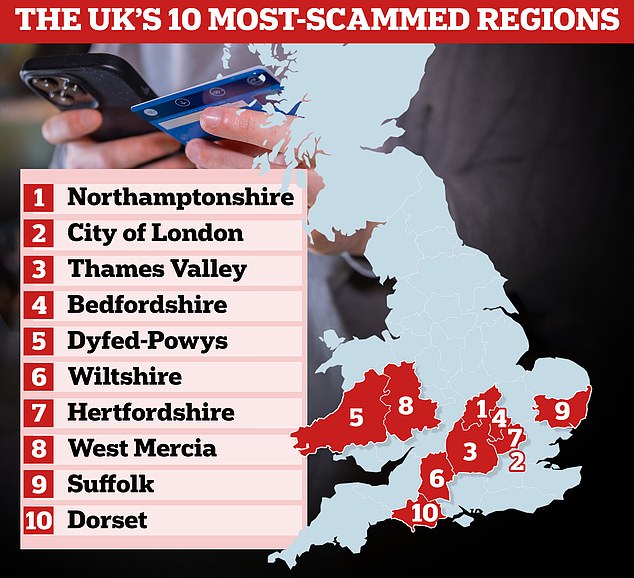
At risk: Northamptonshire residents are the most-scammed in the UK says Idealo
4) If it looks too good to be true, it probably is. Dewdney says: 'Companies will not offer 50-80 per cent discounts on products that are in high demand.
'Fraudsters will use these offers to try and trigger excitement and an emotional response, which limits critical thinking and makes people more likely to buy before they think things through.'
Residents of Northamptonshire are the most at risk for online shopping scams, according to Idealo.
Even once you've successfully purchased an item, you may still have to think about the risk of it being stolen before you receive it.
Dan Smith, security specialist at Checkatrade's Smith & Greens Security, said 'porch pirates' can easily steal packages that are left unattended by delivery drivers.
Smith recommended homes install a lockbox where packages can be safely left, and that they should consider home improvements such as lighting, doorbell cameras and gravel drives.
Keep within your spending limits
Despite Black Friday supposedly being about bargains, the array of discounts can end up leaving shoppers financially worse off if they overspend.
Tesco Bank savings and payments director Chris Henderson said: 'With new discounts and deals everyday in the run-up to Black Friday and Cyber Monday, it can be tempting to spend, spend, spend.
'And while shopping in the sales can mean savings, especially when it comes to Christmas shopping, it's important to take a step back and check that you are sticking to your budget, and what feels affordable.'
Effective ways to keep on top of this is are things which are common sense, but which can be easily forgotten when faced with a pressured, time-sensitive sales situation.
These included avoiding impulse purchases, only shopping for things you really need, shopping around and comparing prices to make sure you really are getting a good deal.
The only thing worse financially worse than overspending is then getting into debt as well.
This is a particular risk when buying items using credit cards.
While credit cards do offer a degree of financial protection for purchases, they also pose the risk of not being able to afford repayments, with interest building up too.
Moneyfacts finance expert Rachel Springall said: 'Consumers waiting to make expensive purchases will no doubt be eyeing up the Black Friday and Cyber Monday sales.
'However, it's vital to take a step back to ensure they can comfortably afford any purchases or have a sensible repayment plan in place to cover the costs, particularly if they are buying electronics.'











































